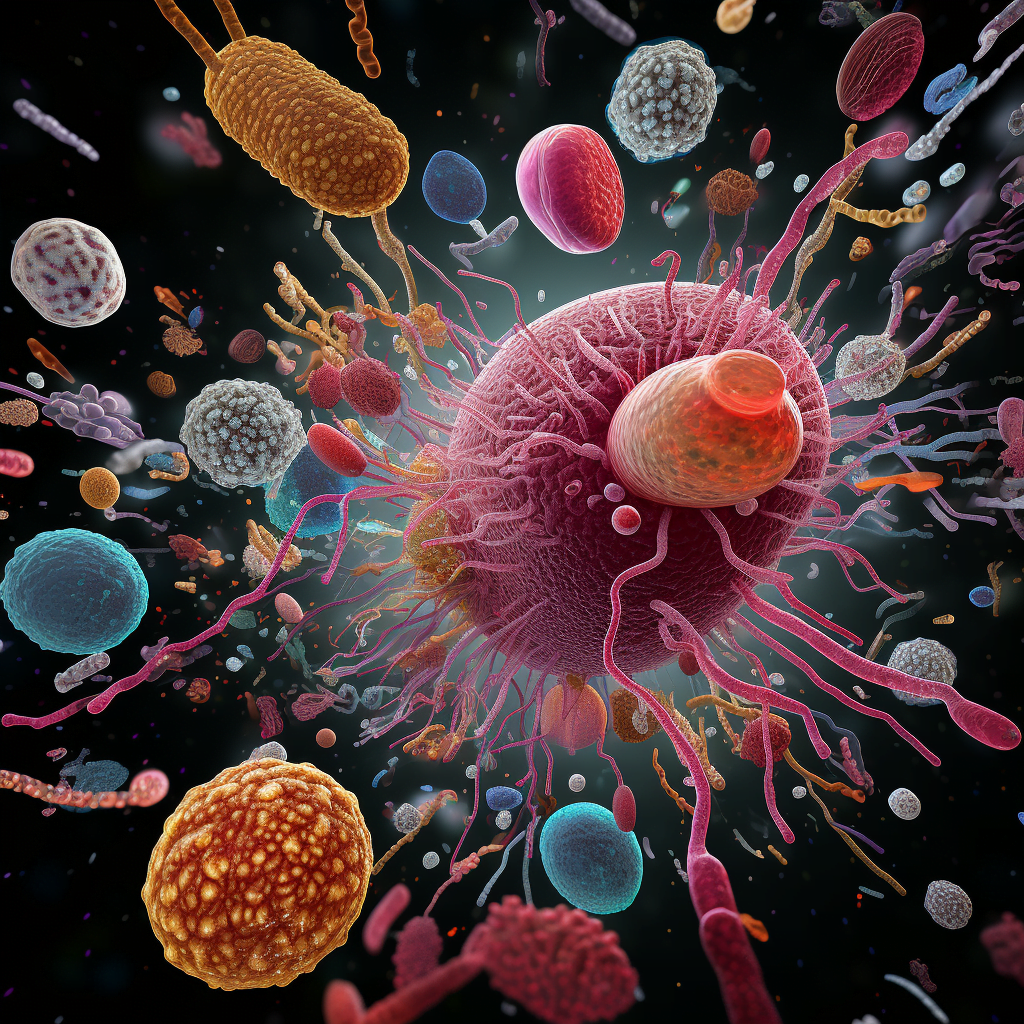The Gut Microbiome : A Key to Optimal Health
Did you know that your gut is home to trillions of tiny organisms, known as the ‘Gut Microbiome’, that play a crucial role in your overall health and well-being? These microbes are not just passive inhabitants of your gut but are active players in regulating your immune system, metabolism, and even mood. In recent years, scientists have made remarkable progress in understanding the complex interactions between the microbiome and human physiology, including the different types of bacteria that make up the microbiome. In this blog post, we will explore the basics of what is a microbiome, its importance, and how it varies among individuals. We will also delve into the functional aspects of the microbiome and its impact on disease progression within the digestive tract. Lastly, we will share some tips on how you can improve your microbiome to achieve optimal health and wellness. So sit back, grab a cup of tea and let’s unlock the secrets of the microbiome together!
Understanding the Gut Microbiome: A Brief Overview
Trillions of microorganisms make up the microbiome, comprising bacteria, viruses, fungi, and other microbes. Its influence on metabolism, immune regulation, and body weight underscore its critical role in human health and disease, including weight loss. Disruption of the microbiome can lead to dysbiosis, impacting vital functions such as metabolism and immune regulation. Numerous studies have established the important role played by different microbial species in maintaining a healthy gut microbiome, with implications for host health and diseases like irritable bowel syndrome, Crohn’s disease, and obesity.
What is a Gut Microbiome?
The microbiome, also known as the human gut microbiota, refers to the diverse community of microorganisms that inhabit the human body, specifically the GI tract or intestinal tract. It includes bacteria, viruses, archaea, and microbial eukaryotes. This intricate ecosystem plays a crucial role in digestion, metabolism, and immune system function. Additionally, the composition of the microbiome varies across different body sites and has a profound impact on overall health and well-being.
Importance of Gut Microbiome
The intricate network of microorganisms within the human body wields a significant influence on overall health. From metabolic activities to immune system regulation, the microbiome plays a vital role in maintaining gut integrity and promoting well-being. A diverse and healthy microbiome is imperative for optimal nutrient metabolism and the development of a robust immune system. The microbiome’s importance cannot be overstated, as understanding its complexities is fundamental to advancing human health.
The Intricate Composition of the Gut Microbiome
Bacteriomes, representing diverse bacterial communities, are pivotal components of the microbiome. Their abundance and types significantly influence the overall composition and function of the microbiome. Similarly, the presence of different species of bacteria contributes to the richness and diversity of the microbiome, playing a crucial role in maintaining a healthy gut microbiome. Alongside bacteriomes, viromes, consisting of viruses, exert an unseen influence on human health, impacting the microbial balance and overall well-being. Moreover, the microbiome’s composition exhibits variations across body sites and individuals, with microbial species varying in types and abundance within the gastrointestinal tract, affecting metabolic processes, immune cells, and overall host health. This intricate composition, which can be studied using tools such as the 16s rrna gene, comprises bacterial, viral, fungal, and other microbial communities, each playing an important role in maintaining a healthy gut and overall well-being.
Bacteriomes and Their Role
Bacteriomes, integral components of the microbiome, exert significant influence on human health, impacting metabolism, immune system function, and gut health. The composition of bacteriomes varies across different body sites, highlighting their diverse roles in maintaining overall well-being. Moreover, the diversity of bacterial species within the microbiome is crucial for promoting and sustaining good health. Understanding the diverse nature of bacteriomes is essential for advancing research on the microbiome’s impact on human health.
Viromes: An Unseen Influence
Uncovering the Influence of Viromes
Comprising a diverse array of viruses, viromes play a pivotal role in shaping human health outcomes. Their impact extends to influencing the diversity of microbial communities, modulating immune responses, and regulating metabolic activities within the body. It’s crucial to note that the composition of viromes varies significantly across different body sites, adding another layer of complexity to the intricate web of the microbiome. Understanding the role of viromes is paramount in unraveling the complexity of the microbiome, as viral communities within the microbiome exert profound effects on human health.
How Gut Microbiome Varies Among Individuals
Age and geographic location exert influence on the composition of the microbiome, resulting in diversity among individuals. Factors such as lifestyle, diet, and socioeconomic status also contribute to the variations in microbiome. Moreover, the microbiome undergoes changes during different life stages, leading to distinct populations in infants, adults, and the elderly. These individual differences in microbiome play a crucial role in shaping personalized health outcomes.
Role of Age and Geography
Dynamic shifts in the microbiome occur throughout various life stages, with age playing a crucial role in shaping microbial diversity and composition. As individuals transition from infancy to old age, the microbiome undergoes significant changes, impacting overall health and well-being. Moreover, geographical location exerts a profound influence on microbiome diversity and the microbial communities that inhabit the human body.
The age-related alterations in the microbiome are linked to microbial diversity and composition, emphasizing the importance of understanding the microbiome’s dynamic nature across different age groups. In parallel, geographic factors contribute to the variations in microbial communities and the population of microbiota, highlighting the complex interplay between environmental influences and the human microbiome.
Impact of Lifestyle and Socioeconomic Status
The composition of the microbiome is shaped by lifestyle choices, diet, and socioeconomic factors. High-stress levels have the potential to impact microbial diversity and the composition of gut microbiota. Moreover, socioeconomic status plays a significant role in influencing microbiome diversity and microbial communities. Additionally, dietary patterns exert a substantial impact on the diversity of gut microbiota. Lastly, lifestyle factors, including exercise, play a crucial role in impacting both microbiome diversity and health outcomes.
Acquisition and Development of Gut Microbiome in Infants
During birth, infants acquire their first microbiome from the mother, establishing the initial microbial colonization essential for gut microbiota development. Prebiotics in breast milk play a significant role in promoting a healthy gut microbiota in infants, influencing the composition of microbial species and supporting the immune system. The mode of delivery and other environmental factors also impact the infant’s microbiome composition, reflecting the important role of early microbial colonization in shaping the gut microbiota and preventing weight gain. This early composition not only affects the immediate health of the infant but also has implications for long-term metabolic processes and immune cells.
Functional Aspects of the Gut Microbiome
The role of the microbiome in immune regulation and metabolic processes is crucial for overall health. It directly impacts gut integrity and plays a significant role in regulating body weight. The composition of the microbiome has far-reaching effects on human health, metabolism, and the immune system, highlighting its importance for overall well-being. Research indicates that maintaining diversity in gut microbiota is essential for promoting human health, indicating the need to support and nurture a healthy gut microbiome. Additionally, the microbiome significantly influences the body’s inflammatory responses, further underlining its critical role in maintaining overall health and well-being.
Microbiome’s Role in Inhibiting Pathogens
The population of microbiota plays a crucial role in inhibiting pathogens within the gastrointestinal system, influencing resistance to intestinal pathogens. The diversity of gut microbiota has a significant impact on the body’s ability to resist harmful pathogens present in the gut. Furthermore, the composition of the human gut microbiome, also known as gut microflora, directly affects the inhibition of pathogens and overall gut health. It is important to note that dysbiosis, an imbalance in the gut microbial community, can greatly impact the microbiome’s ability to inhibit harmful pathogens, leading to potential health issues. Recent microbiome research has shed light on the essential role of gut bacteria in pathogen resistance, highlighting the significance of maintaining a healthy gut microbiome for overall well-being.
Influence on Metabolic Processes
The diversity of the microbiome has a significant impact on metabolic syndrome, including obesity, insulin resistance, and Type 2 diabetes. Research emphasizes the crucial role of gut microbes in metabolism, highlighting their influence on insulin sensitivity and metabolic health. The composition of gut microbiota plays a vital role in the body’s metabolic regulation, affecting metabolic syndrome and body weight regulation. Additionally, the microbiome’s influence on metabolic processes, such as insulin resistance, underscores its importance in overall human health and well-being.
The Gut-Brain Axis: A Crucial Connection
The significant impact of the gut microbiome on mental health and nervous system regulation cannot be overstated. Current research strongly indicates the role of gut flora in signaling along the gut-brain axis and its influence on mental health. It’s clear that the composition of the microbiome plays a pivotal role in shaping communication along the gut-brain axis and subsequently affecting mental health. The gut microbiota’s impact on neurological health is a key focus of numerous ongoing studies, emphasizing its crucial role in overall well-being and health.
Consequences of Altered Microbiota Balance
Altered microbiota balance may lead to dysbiosis and gut dysbiosis-related health issues while the effects of antibiotic use on microbiota composition can result in dysbiosis. Research underlines the impact of diet on gut microbiota composition and microbial diversity, showing how altered gut microbiota composition can influence overall health and immune system regulation. These dysbiosis-related effects of altered microbiota balance have a significant impact on human health, emphasizing the intricate relationship between the microbiome and the body’s equilibrium.
The consequences of an imbalanced microbiota extend to immune system dysregulation, highlighting the crucial role of microbial species in maintaining a healthy gut microbiome. Furthermore, dysbiosis can contribute to conditions like irritable bowel syndrome, characterized by abdominal pain and discomfort, Crohn’s disease, and metabolic disorders, as found in a systematic review, indicating the far-reaching implications of altered microbiota balance and potential side effects. This emphasizes the importance of understanding the delicate balance of the gut microbiota and its implications for host health and well-being.
The Effects of Antibiotics on Microbiota
Antibiotic use has a significant impact on the composition and diversity of gut microbiota. Research indicates that it may lead to dysbiosis and dysregulation of the gut microbiome. This highlights the importance of studying the effects of antibiotic use on gut microbiota composition, as it is a key research focus. The impact of antibiotics on microbial diversity and gut health cannot be understated, and it underscores the significance of understanding how antibiotic use affects the gut microbiota.
Influence of Diet and Exercise on Microbiota
The composition and diversity of gut microbiota are influenced by both diet and exercise. Extensive research has highlighted the significant role of diet in shaping the composition and overall health of gut microbiota. Similarly, the impact of exercise on the diversity and composition of gut microbiota is an area of active study within the field of microbiome research. One of the key focal points of microbiome research is to emphasize the sensitivity of the gut microbiome to the effects of diet and exercise, and how these factors contribute to overall gut microbiota health.
The association between diet and exercise with gut microbiota health has been underscored by a number of studies, emphasizing the pivotal role of these lifestyle factors in maintaining a healthy gut microbiome. The understanding of how diet and exercise influence the microbial species within the gut, including the impact of artificial sweeteners, can provide crucial insights into promoting host health and preventing dysbiosis-related health issues.
Gut Microbiome’s Impact on Disease Progression
The composition and diversity of the gut microbiome play a pivotal role in disease progression and overall gut health. This is underscored by research that highlights the significant impact of gut microbiota on conditions such as inflammatory bowel disease and heart disease, emphasizing the crucial connection between the microbiome and disease progression. The role of dysbiosis-related effects arising from microbiome composition is a key area of focus in understanding the mechanisms through which the microbiome impacts disease progression. Additionally, the influence of the gut microbiota on disease progression remains a prominent subject of exploration in the field of microbial research, signifying its importance in unraveling the complex interplay between the microbiome and various diseases.
How Can You Improve Your Microbiome?
To improve your microbiome, consider incorporating dietary supplements, probiotics, and whole grains into your routine. Research suggests that prebiotics and dietary fiber also play a role in enhancing gut microbiota health. By maintaining a healthy diet and lifestyle, you can positively impact the composition of your gut microbiota.
Conclusion
In conclusion, understanding the secrets of the microbiome can have a profound impact on our health and well-being. The microbiome plays a crucial role in various aspects of our lives, from digestion and metabolism to immune function and mental health. By recognizing the factors that influence the composition of our microbiota, such as age, geography, lifestyle, and socioeconomic status, we can take steps to improve and maintain a healthy microbiome.
It is important to note that certain factors, like antibiotic use and poor diet, can disrupt the delicate balance of our microbiota and lead to negative health outcomes. However, by making conscious choices, such as consuming a diverse range of fiber-rich foods and engaging in regular exercise, we can support the growth of beneficial bacteria and promote a healthy microbiome.
Incorporating these practices into our daily lives can not only improve our own health but also contribute to the overall understanding and research of the microbiome. Together, we can unlock the full potential of this fascinating ecosystem within us.
Visit our Quiz site on Youtube : Wellness Quiz Hub
Disclaimer: This article is for informational purposes only and should not replace professional medical advice. Consult with a healthcare professional before starting any new exercise or diet regimen.
This article may contain affiliate links, and if you click on them and make a purchase, I may earn a commission at no additional cost to you.




